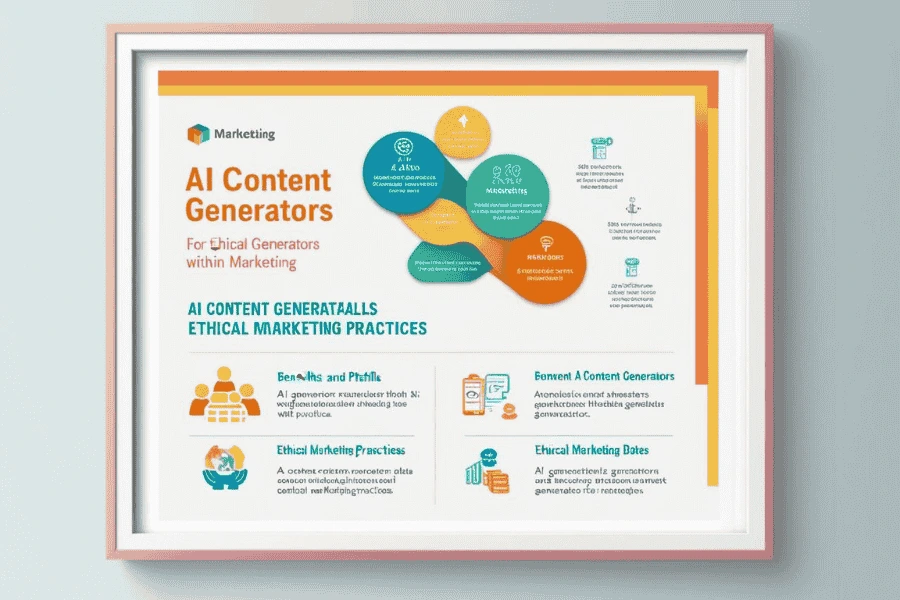AI Content Generators: Benefits, Pitfalls, and Ethical Use in Marketing
Introduction: The Rise of AI in Content Marketing Artificial Intelligence (AI) has transformed how marketers plan, produce, and scale content. AI content generators—powered by natural language processing and machine learning—can create blog posts, ad copy, product descriptions, and more within seconds. While these tools offer speed and efficiency, they also raise important concerns about quality, ethics, and originality. Understanding the benefits, pitfalls, and responsible use of AI-generated content is crucial for modern marketers.

Benefits of AI Content Generators in Marketing
1. Speed and Scalability AI tools can generate content quickly, making it possible to publish more frequently and stay ahead of content demand. This is especially useful for high-volume environments such as e-commerce, news publishing, and SEO-driven campaigns. 2. Cost Efficiency AI-generated content reduces the time and human resources needed for content creation. While not a replacement for expert writers, it can significantly lower costs for first drafts, outlines, or repetitive content like meta descriptions and FAQs. 3. Personalization at Scale AI engines can analyze user data to generate personalized content tailored to different audiences. Marketers can create multiple content variations for A/B testing or segment-specific messaging with minimal effort. 4. Multilingual Content Production AI tools can quickly translate and adapt content across languages, helping global brands reach diverse markets without hiring large translation teams.
Pitfalls and Limitations
1. Quality and Coherence Issues While AI can mimic human language, it still struggles with nuance, tone consistency, and contextual accuracy. Without human oversight, the content may sound robotic, be factually incorrect, or lack brand voice. 2. Plagiarism and Content Duplication Some AI models may inadvertently reproduce content from their training data, raising concerns about plagiarism and copyright infringement. Relying solely on AI-generated content can jeopardize SEO and brand credibility. 3. SEO and Ranking Risks Search engines prioritize originality and user value. Overuse of templated or low-quality AI content may lead to lower rankings or even penalties if detected as spam. 4. Dependency on Technology Over-reliance on AI tools may hinder a brand's unique voice or reduce critical thinking in content strategy. Human creativity, emotion, and storytelling are still irreplaceable elements of effective marketing.
Ethical Considerations in Using AI Content
- Content Ideation and Planning: Tools like BuzzSumo and SEMrush help automate the content ideation process by providing insights into trending topics, keywords, and competitor analysis. These tools allow creators to identify content opportunities and plan their editorial calendar effectively.
- Writing and Editing: Automation tools such as Grammarly and Hemingway aid in the writing and editing process by automatically checking grammar, spelling, and readability. These tools ensure that content is polished and error-free before publication.
- Content Management: Content management systems (CMS) like WordPress and HubSpot offer automation features for organising, scheduling, and publishing content. These platforms streamline the content management process, ensuring timely and consistent publication.
- Social Media Management: Tools like Hootsuite and Buffer automate the scheduling and posting of content across various social media platforms. They also provide analytics to measure engagement and performance, allowing for optimised social media strategies.
- Email Marketing: Automation tools such as Mailchimp and Constant Contact facilitate the creation and distribution of email campaigns. These tools personalise content, automate sending schedules, and track engagement metrics, enhancing the effectiveness of email marketing efforts.
- Content Distribution: Automation platforms like Zapier integrate different tools and platforms, enabling automated content distribution across multiple channels. This integration ensures that content reaches the target audience efficiently without manual intervention.
Conclusion: Balancing Innovation with Responsibility
AI content generators are reshaping the content marketing landscape by offering unmatched speed, scalability, and data-driven capabilities. However, marketers must balance these advantages with caution, oversight, and ethical responsibility. When used thoughtfully and strategically, AI can empower marketers—not replace them—while maintaining trust, quality, and brand integrity.
Active Events
From Insights to Impact: Proven B2B Marketing Strategies for Scalable Success
Date: Aug 08, 2025 | 7:00 PM(IST)
7:00 PM(IST) - 8:10 PM(IST)
2811 people have registered
Your Data Science Career Game-Changing in 2024: Explore Trends and Opportunities
Date: Aug 08, 2025 | 7:00 PM (IST)
7:00 PM (IST) - 8:10 PM (IST)
2811 people have registered
Bootcamps
Digital Marketing Bootcamp
- Duration:4 Months
- Start Date:Aug 09, 2025
Data Science Bootcamp
- Duration:4 Months
- Start Date:Aug 09, 2025
